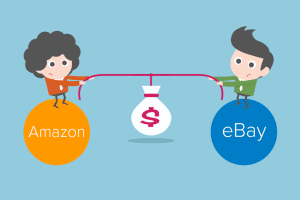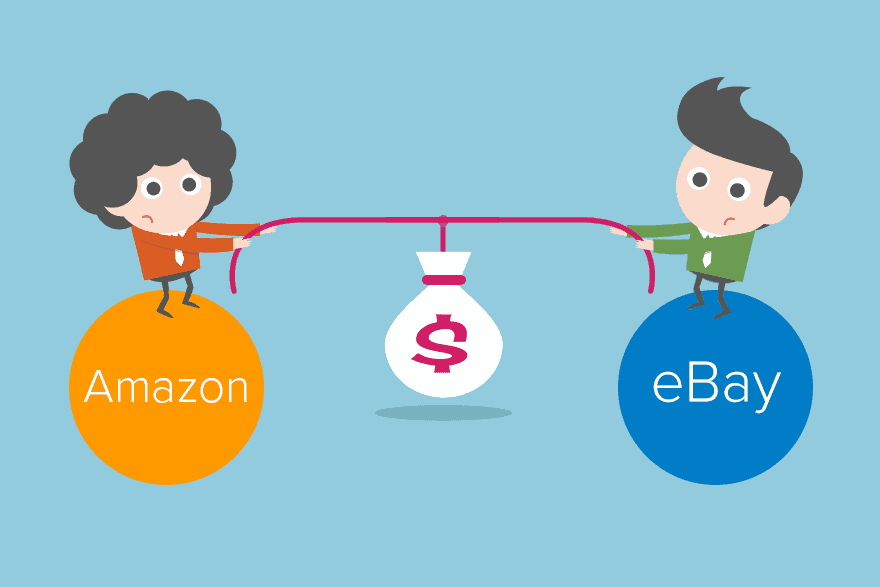Are you trying to decide between Amazon vs eBay, but have no idea what platform you should start selling on? Ideally, you should sell on both platforms since that ensures you can get more customers. However, if you have to choose just one, we will showcase the differences between the e-commerce platforms to help you make the right choice for your business.
Understanding the differences will help you make an informed choice. Hence, you can increase your sales, and customers, and have an easier time starting your online business. Eventually, you may want to sell on multiple platforms since business diversification leads to longevity.
Amazon Has the Most Buyers
Despite eBay being an older platform, Amazon has the biggest slice of the e-commerce pie. For example, eBay has 182 million users worldwide, while Amazon has over 200 million Prime members.
Therefore, you can potentially scale faster on Amazon compared to eBay. Also, since there are more buyers, the higher levels of competition are not as much of a problem. That’s because you only need to receive a small slice of the large pie available on Amazon.
Note that for specific niches, you may find that eBay has a higher sales volume. This might be used products and memorabilia items, which eBay is known for.
The Bid Format on eBay
eBay is known for its bidding format, which allows users to compete to buy products. This format is great for getting high sales prices for products that are in demand. However, it can also backfire if the final price is lower than you’d like.
On the other hand, Amazon doesn’t offer a bid format for their product listings. Therefore, you need to specify a final price for each transaction. This might be limiting for sellers that prefer to use the bid format.

Amazon FBA
Amazon provides a service called Fulfillment by Amazon, and a comparable service is not offered by eBay. This service allows you to send your products to Amazon warehouses, and they are sent to customers once a transaction is completed. Here are a few advantages of Amazon FBA:
- Scalability: the Amazon FBA service is ideal for soo operators that don’t have a team of employees. It means they can send large volumes of products no matter how high they scale. Therefore, it’s possible to have a large business without hiring employees.
- Cost: Amazon FBA requires a fee, but their service may save you money in the long-run. For example, you may find that their delivery rates are lower than what you’d pay elsewhere.
- Improves product listing quality: when you take advantage of the Amazon FBA service, you’ll find that your product listing quality metrics will improve. That’s because you’ll receive a perfect score for factors like delivery speed and percentage of orders that offer tracking.
- Delivery speed: you’re likely to achieve more consistent and faster delivery speeds if you take advantage of Amazon FBA. that’s because they have warehouses all over the United States, and a large number of employees processing orders. Also, their delivery network is among the best in the world since they have invested billions in the infrastructure.
- Storage space: If you need a large volume of storage for big products, then you can get that with Amazon FBA. However, you must make sure that you sell any products you send to Amazon FBA quickly since storage fees can eat into your profits.
Amazon Has A Better UI
You’ll need to know your way around the dashboard of an e-commerce platform to add new products and manage existing ones. However, the UI for the Amazon dashboard is better since you have more control and functionality. Also, it has a cleaner look, especially if you need to manage hundreds of products.
Whereas, the eBay UI lacks the polish to perform some action efficiently Hence, you’ll need more time to get used to the UI and there is an upper limit to how quickly you can perform some tasks.
eBay Has Lower Fees
Overall, the fees you can expect to pay at Amazon are about 15%, and on eBay it’s about 12-13%. This might seem like a small difference, but in reality, it can have a big impact on profitability. That’s especially true for products that have a razor-thin profit margin. It can be the difference between a product being viable and not meeting the profit criteria to make the cut.
However, the fees on both platforms vary considerably. For example, eBay charges fees for creating a listing and then once a transaction is completed. Hence, you should inspect the fee structures of both e-commerce platforms in greater detail.
Try Both Platforms
We recommend that you can create accounts with both platforms to settle the Amazon vs eBay debate. Having first-hand experience with both platforms ensures that you can make the choice based on your specific use case. You don’t have to sell large volumes of stock to try the platforms, just enough to get a feel for how everything works.
Also, you can look at the experiences of other sellers by examining the comments they are leaving online. Hence, you can have realistic expectations of each e-commerce platform. You’ll see there are many differences between Amazon and eBay, and understanding them all will help you make the best choice for your e-commerce business.
Final Thoughts
To conclude, making the choice between Amazon vs eBay depends on what you need. If you’re after the lowest fees and an auction format, then eBay is your best option. However, if you need a large number of buyers, better UI, and fulfillment services, then Amazon is the better option.
However, if you can branch out your business to both e-commerce platforms, then that might be the best choice in pursuit of getting the most customers. That’s because some customers only shop on a single platform, so you’ll need to diversify to find them.








